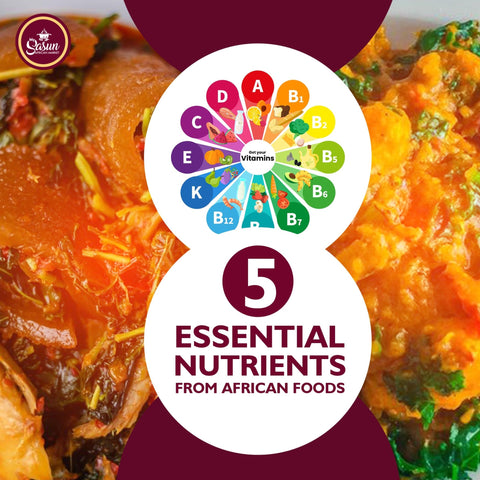If you're looking for a way to spice up your diet and improve your health, look no further than African cuisine. This diverse and delicious cuisine is not only a feast for the human senses, but also a powerhouse of nutrition. African foods are packed with essential nutrients that can benefit your body and mind in many ways. At My Sasun African Market, we are proud to offer a variety of authentic African ingredients that you can use to create your own healthy and tasty dishes. Here are some of the key nutrients you can get from eating African foods and how they can help you:
1. Protein
Protein is vital for your health, as it helps you build and repair muscles, fight infections, and grow and develop properly. African cuisine has plenty of protein options, both from animal and plant sources. You can enjoy lean meats like chicken, fish, and goat, or go for vegetarian options like beans, lentils, and peanuts. Try dishes like Jollof rice with grilled fish or vegetarian mafe stew for a satisfying and protein-rich meal.
2. Fiber
Fiber is important for your digestive health, as it helps you have regular bowel movements, lower your cholesterol, and keep your blood sugar stable. African foods are rich in fiber, especially from starchy foods like cassava, plantains, and yams. You can also get fiber from traditional dishes like fufu and banku, which are made from fermented grains like corn and cassava. These foods can help you feel full and support a healthy gut.
3. Vitamins
Vitamins are essential for various functions in your body, such as keeping your skin and eyes healthy, boosting your immunity, and preventing chronic diseases. African foods are loaded with vitamins, especially vitamin A, vitamin C, and vitamin E. You can get these vitamins from leafy greens like spinach and kale, and fruits like mangoes, papayas, and oranges. These foods can also add a burst of color and flavor to your dishes. Try a refreshing spinach stew or a sweet and tangy mango salad for a vitamin-packed treat.
4. Minerals
Minerals are important for your bone health, nerve function, and fluid balance. African foods provide a range of minerals, such as calcium, iron, and potassium. You can get these minerals from ingredients like cowpeas, okra, and pumpkin seeds, which are high in iron, and leafy greens and sesame seeds, which are high in calcium. These foods can help you avoid deficiencies and improve your well-being.
5. Healthy Fats
Fats are not all bad for you; in fact, some fats are essential for your brain function, hormone production, and cell membrane integrity. West African cuisine uses healthy fats from sources like palm oil, coconut oil, and shea butter. These fats add a rich and deep flavor to your dishes, while also providing essential fatty acids that support your heart health and cognitive function. Enjoy a cozy bowl of peanut soup or a crispy piece of fried plantain for a delicious dose of healthy fats.
Rounding Off:
As you can see, West African foods are not only tasty, but also nutritious. By adding ingredients like lean meats, fiber-rich grains, vitamin-packed fruits and vegetables, mineral-rich legumes, and healthy fats to your diet, you can enjoy the amazing flavors of West Africa and improve your health and well-being. Visit My Sasun African Market today and discover our wide selection of authentic West African ingredients and start your journey to a healthier lifestyle today! You can also start shopping on mysasun.com right away. We deliver to all states of the US.







Comments (4)
Am here to let the whole world know that I was diagnose of herpes 3 years ago where all hope was lost and I had nothing to do about it,I just accepted the faith that one day I will cure of this disease and I just pray everyday for a helper and one day my sister introduce me to a herbal doctor man called Dr ahonsie that she saw him on internet well I contact him on his email,I was not fully convinced until he sent me the herbal medicine which he ask me to take for two weeks I took it with faith and i went for a retest in different hospitals and today am cured of this disease and am also using this medium to let all those having STD,like herpes and the rest not to give up,their is a man who can cure you,his name is Dr ahonsie . contact the great herbalist via his Email: drahonsie00@gmail.com / WhatsApp: +2348039482367. https://drahonsie002.wixsite.com/dr-ahonsie
Hello everyone, i have a very important information about herpes virus, i was a victim of hsv1&2 until i met doctor Ahonsie, it still feels like a dream to me. it has been two years now, i have not experience any breakout of herpes. I new about him through a post made on social media, a lady shares her experience and then i decided to contact him and ever since i contacted i was encourage and with no doubt i was cured from herpes simplex in just two weeks. He also treat other illnesses like HPV, HIV, CANCER, THYRIOD, PENIS ENLARGEMENT, and more contact him via Email: drahonsie00@gmail.com / WhatsApp: +2348039482367. https://drahonsie002.wixsite.com/dr-ahonsie https://www.facebook.com/drstellaherbalhome?mibextid=ZbWKwLThanks
I thought the physicians says there is no cure for HSV 2!!! I am telling you today that Dr ahonsie cure HSV 2 with his herbal medicine and once you get cured you are cured forever it is never reversible, I have been suffering for this deadly disease called h HSV 2 for more than a 2years and lost all hope because my doctor says there is no cure for HSV 2. Brethren I saw a testimony on the internet on how Dr ahonsie cure HSV, Hapatitis etc with his herbal medication and an email and watsapp to contact him was also displayed, I thought this was joke but I decided to contact him and he replied telling me not to worry that my problem is over . Dr ahonsie sent me a herbal medication to drink for one month but only 2weeks I feel strange and I went to my doctor and he confirmed me negative. He can help you too. Contact him drahonsie00@gmail.com or whatsapp +2348039482367 https://drahonsie002.wixsite.com/dr-ahonsie https://www.facebook.com/drstellaherbalhome?mibextid=ZbWKwL
My purpose out here today is to share this article to the world about how Doctor Odunga helped me in getting back my EX-boyfriend who broke up with me 4 months ago. I tried all I could to make him see reasons with me so that we can continue our relationship but he denied me. Thank God for giving me the thought of going into the internet for help, I searched properly and I saw different reviews of Doctor Odunga and I insisted on giving it a try by contacting him via what’s app on (+2348167159012). He gave me reason to live again and he prepared a spell and told me that my Ex-boyfriend will come back to me within 11 hours. Can you believe it, my EX-boyfriend came back to me, proposed to me and our wedding will be held soon. Contact him now!!! if you need any help. Email: odungaspelltemple@gmail.com and he does a lot of spells. Once again i want to say am very grateful for your help